
RADIO VATICANA REPORTS:
****************
Dear Brother Bishops,
I greet you all with affection in the Lord and, through you, the Bishops from the United States who in the course of the coming year will make their visits ad limina Apostolorum.
Our meetings are the first since my 2008 Pastoral Visit to your country, which was intended to encourage the Catholics of America in the wake of the scandal and disorientation caused by the sexual abuse crisis of recent decades. I wished to acknowledge personally the suffering inflicted on the victims and the honest efforts made both to ensure the safety of our children and to deal appropriately and transparently with allegations as they arise. It is my hope that the Church’s conscientious efforts to confront this reality will help the broader community to recognize the causes, true extent and devastating consequences of sexual abuse, and to respond effectively to this scourge which affects every level of society. By the same token, just as the Church is rightly held to exacting standards in this regard, all other institutions, without exception, should be held to the same standards.
A second, equally important, purpose of my Pastoral Visit was to summon the Church in America to recognize, in the light of a dramatically changing social and religious landscape, the urgency and demands of a new evangelization. In continuity with this aim, I plan in the coming months to present for your consideration a number of reflections which I trust you will find helpful for the discernment you are called to make in your task of leading the Church into the future which Christ is opening up for us.
Many of you have shared with me your concern about the grave challenges to a consistent Christian witness presented by an increasingly secularized society. I consider it significant, however, that there is also an increased sense of concern on the part of many men and women, whatever their religious or political views, for the future of our democratic societies. They see a troubling breakdown in the intellectual, cultural and moral foundations of social life, and a growing sense of dislocation and insecurity, especially among the young, in the face of wide-ranging societal changes. Despite attempts to still the Church’s voice in the public square, many people of good will continue to look to her for wisdom, insight and sound guidance in meeting this far-reaching crisis. The present moment can thus be seen, in positive terms, as a summons to exercise the prophetic dimension of your episcopal ministry by speaking out, humbly yet insistently, in defense of moral truth, and offering a word of hope, capable of opening hearts and minds to the truth that sets us free.
At the same time, the seriousness of the challenges which the Church in America, under your leadership, is called to confront in the near future cannot be underestimated. The obstacles to Christian faith and practice raised by a secularized culture also affect the lives of believers, leading at times to that “quiet attrition” from the Church which you raised with me during my Pastoral Visit. Immersed in this culture, believers are daily beset by the objections, the troubling questions and the cynicism of a society which seems to have lost its roots, by a world in which the love of God has grown cold in so many hearts. Evangelization thus appears not simply a task to be undertaken ad extra; we ourselves are the first to need re-evangelization. As with all spiritual crises, whether of individuals or communities, we know that the ultimate answer can only be born of a searching, critical and ongoing self-assessment and conversion in the light of Christ’s truth. Only through such interior renewal will we be able to discern and meet the spiritual needs of our age with the ageless truth of the Gospel.
Here I cannot fail to express my appreciation of the real progress which the American Bishops have made, individually and as a Conference, in responding to these issues and in working together to articulate a common pastoral vision, the fruits of which can be seen, for example, in your recent documents on faithful citizenship and on the institution of marriage. The importance of these authoritative expressions of your shared concern for the authenticity of the Church’s life and witness in your country should be evident to all.
In these days, the Church in the United States is implementing the revised translation of the Roman Missal. I am grateful for your efforts to ensure that this new translation will inspire an ongoing catechesis which emphasizes the true nature of the liturgy and, above all, the unique value of Christ’s saving sacrifice for the redemption of the world. A weakened sense of the meaning and importance of Christian worship can only lead to a weakened sense of the specific and essential vocation of the laity to imbue the temporal order with the spirit of the Gospel. America has a proud tradition of respect for the sabbath; this legacy needs to be consolidated as a summons to the service of God’s Kingdom and the renewal of the social fabric in accordance with its unchanging truth.
In the end, however, the renewal of the Church’s witness to the Gospel in your country is essentially linked to the recovery of a shared vision and sense of mission by the entire Catholic community. I know that this is a concern close to your own heart, as reflected in your efforts to encourage communication, discussion and consistent witness at every level of the life of your local Churches. I think in particular of the importance of Catholic universities and the signs of a renewed sense of their ecclesial mission, as attested by the discussions marking the tenth anniversary of the Apostolic Constitution Ex Corde Ecclesiae, and such inititiatives as the symposium recently held at Catholic University of America on the intellectual tasks of the new evangelization. Young people have a right to hear clearly the Church’s teaching and, most importantly, to be inspired by the coherence and beauty of the Christian message, so that they in turn can instill in their peers a deep love of Christ and his Church.
Dear Brother Bishops, I am conscious of the many pressing and at times apparently insoluble problems which you face daily in the exercise of your ministry. With the confidence born of faith, and with great affection, I offer you these words of encouragement and willingly commend you and the clergy, religious and lay faithful of your Dioceses to the intercession of Mary Immaculate, Patroness of the United States. To all of you I impart my Apostolic Blessing as a pledge of wisdom, strength and peace in the Lord.Listen
It is my hope that the Church’s conscientious efforts to confront this reality will help the broader community to recognize the causes, true extent and devastating consequences of sexual abuse, and to respond effectively to this scourge which affects every level of society. By the same token, just as the Church is rightly held to exacting standards in this regard, all other institutions, without exception, should be held to the same standards.
The Holy Father also discussed the urgent need for a new evangelization, promising to offer the Bishops a number of reflections on the theme in the coming months, before going on to express concern for what he called the grave challenges to a consistent Christian witness presented by an increasingly secularized society. Noting that many of the bishops themselves shared this concern with him, Pope Benedict went on to say that these concerns are wrapped up in the broader issue of the very future of the experiment with ordered liberty in society…
I consider it significant, however, that there is also an increased sense of concern on the part of many men and women, whatever their religious or political views, for the future of our democratic societies. They see a troubling breakdown in the intellectual, cultural and moral foundations of social life, and a growing sense of dislocation and insecurity, especially among the young, in the face of wide-ranging societal changes. Despite attempts to still the Church’s voice in the public square, many people of good will continue to look to her for wisdom, insight and sound guidance in meeting this far-reaching crisis.
Pope Benedict went on to tell the bishops that the present moment can thus be seen, in positive terms, as a summons to exercise the prophetic dimension of their episcopal ministry by speaking out, humbly yet insistently, in defense of moral truth, and offering a word of hope, capable of opening hearts and minds to the truth that sets us free.
Here I cannot fail to express my appreciation of the real progress which the American Bishops have made, individually and as a Conference, in responding to these issues and in working together to articulate a common pastoral vision, the fruits of which can be seen, for example, in your recent documents on faithful citizenship and on the institution of marriage. The importance of these authoritative expressions of your shared concern for the authenticity of the Church’s life and witness in your country should be evident to all.
Pope Benedict also touched on the implementation of the new English translation of the Roman Missal, which begins in full this weekend. Noting that a weakened sense of the meaning and importance of Christian worship can only lead to a weakened sense of the specific and essential vocation of the laity to imbue the temporal order with the spirit of the Gospel, the Holy Father went on to note America’s proud tradition of respect for the Sabbath, saying that this legacy needs to be consolidated as a summons to the service of God’s Kingdom and the renewal of the social fabric in accordance with its unchanging truth
ASIA : SRI LANKA : POLICE RAID MISSIONARY ORPHANAGE

Police this week conducted a raid on a Catholic Church-run orphanage in Colombo archdiocese on suspicion that the facility was engaged in child trafficking, according to an official with the National Child Protection Authority (NCPA).
Anoma Dissanayake, chairperson of the NCPA, accompanied police on November 23 to the Prem Niwasa orphanage run by the Sisters of the Missionaries of Charity in Moratuwa after receiving an anonymous tip via an emergency hotline.
“Investigations are [being conducted] on [alleged] illegal activities at this … orphanage,” said Dissanayake.
“A few foreigners were present at the time of inspection. Police are conducting an investigation to ascertain whether they were present to take away children housed at the orphanage.”
Police took statements from several officials and pregnant mothers at the home, where 75 children, 20 pregnant women and 12 new mothers were in residence at the time of the raid.
Sister Mary Elisha, head of the Prem Niwasa orphanage, denied any wrongdoing at the facility and added that she was concerned about bad publicity in the local media by the spreading of false information about the Church-run orphanage.
“NCPA officials, police officers and media groups rushed to our facility, investigated and cross-examined unwed mothers,” she said.
“[They] took many documents belonging to our home, including registration books and files, for further investigation. Although authorities did not remove even one child from the orphanage, some media groups published that NCPA had taken our children into custody.”
She added: “We have never been involved with child trafficking. It is against our faith. It is our mission to care for children and unwed mothers.”
A 14-year-old unwed mother who gave birth to a child on November 2, said without the assistance of the nuns at the orphanage, she would have had nowhere to turn.
“My cousin raped me and I became pregnant. I will continue my studies and want to be a doctor to serve the people,” she said.
Police have increased security at the orphanage, which is officially registered with the government, and are keeping records of all who visit the facilities.
http://www.ucanews.com/2011/11/25/police-raid-church-run-orphanage/
AUSTRALIA : LARGE OUTDOOR NATIVITY AT CATHEDRAL
Catholic Communications, Sydney Archdiocese REPORT
25 Nov 2011
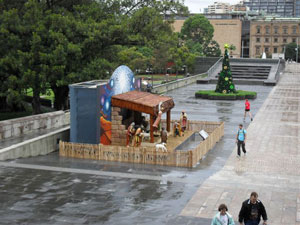
Nativity Scene St Mary's Cathedral 2011-12
The life-size beautifully crafted resin figures of the Holy Mother, Joseph, the Christ child, the Angel Gabriel, the three Kings, shepherds and livestock have taken up their places in St Mary's Cathedral's Outdoor Nativity.
The 12 figures, created, carved and painted in Italy by ecclesiastical artisans were installed in the Outdoor Nativity of the Cathedral forecourt yesterday. But electricians who will rig the impressive new lighting system donated to the Archdiocese for the Nativity are waiting for a break in the weather.
"The last few days have been too wet and windy. But this is the final touch and we hope to have the lighting installed later today, or at the latest tomorrow morning," says Dieter Koch, Property Officer for the Sydney Archdiocese.
On 27 November, the first Sunday in Advent, the Outdoor Nativity will be blessed by the Archbishop of Sydney, Cardinal George Pell following the 10.30am Solemn Choral Mass at the Cathedral. After the Mass, St Mary's Cathedral Choir will lead the congregation through the Cathedral doors and down the steps to Cathedral Square and the Outdoor Nativity.
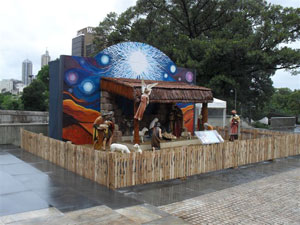
Nativity Scene St Mary's Cathedral 2011-12
In addition to the Cathedral congregation, as many as 1500 Sydneysiders are expected to attend the blessing in what has become a beloved tradition in the lead up to Christmas.
According to the weather reports for the weekend, no rain is predicted for Sunday and with temperatures rising to 26 degrees Celsius, there should be a return to summer after almost a week of non- stop rain and unseasonal chill.
Following the Solemn Choral Mass and the Blessing of the Outdoor Nativity, Embrace, the Cathedral's Youth Group have organised a South-East Asian food festival complete with stalls and fun for the whole family.
Then at 12.30 pm, Cardinal Pell will officially open the annual Children's Christmas Story Art Exhibition and Competition in the Cathedral Crypt. The outstanding 89 artworks by Year 5 and Year 6 students, chosen from more than 1000 entries from schools across the Archdiocese and as far south as Wollongong, will be displayed in the Crypt for the next four weeks.
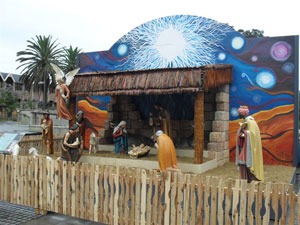 | 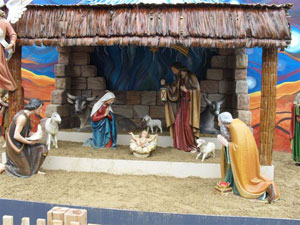 | 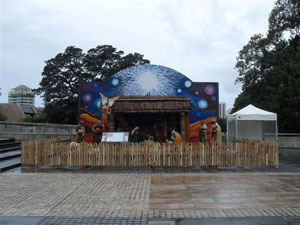 |
Nativity Scene St Mary's Cathedral 2011-12 http://www.sydneycatholic.org/news/latest_news/2011/20111125_1581.shtml | ||
EUROPE : GREAT BRITAIN : CATHOLIC SCHOOL HOLDS 24- HOUR RETREAT
CATHOLICHERALD REPORT: Ambrose College pupils go on retreat at Savio House in Bollington, Cheshire
By STAFF REPORTER on Thursday, 24 November 2011

Headmaster Michael Thompson and head of RE Matthew O’Neill with pupils Marcus Sinclair and Thomas Whittle
CATHOLICHERALD REPORT: St Ambrose College’s first-year boys got in touch both with God and each other at a recent full-year retreat at Savio House.
All 150 boys in Year 7 enjoyed a 24-hour retreat at the rural centre in Bollington in the heart of Cheshire. They were guided and inspired by clergy of the Salesians of Don Bosco, and a team of lay volunteers who devote an entire year to working with young people.
The retreat, organised by the Catholic grammar school’s head of Religious Education, Matthew O’Neill, is seen as an essential element of life in a contemporary Catholic school.
Mr O’Neill said: “The retreat is an important part of the induction programme for our First Year boys. It is hoped that boys will receive both spiritual and social benefits from their experience.
“Taking time away from the business of everyday school life to spend periods of reflection and prayer, helps boys to develop an awareness of their inner, spiritual life and their relationship with God.”
AMERICA : COLOMBIA : SIGNIS MOVEMENT COMMITMENT TO PEACE
To support the coordination, the exchange of experiences, formation, research and collaboration among institutions and individuals, a group responsible for the management SIGNIS Colombia was formed by members of UNIMINUTO, Central University, by Pauline sisters and the Episopal Conference. This group is still open to individuals and organizations interested in promoting communication based on the principles and human and Christian values. The coordination group was formed by Father Jose Elver Rojas (CEC), Sister Lucelly Villa (FSP), Jacqueline Alarcón (UC), Luis Guillermo Rubiano and Carlos Cantor (UNIMINUTO).
The Colombian Catholic communicators have a rich experience, wide and diversified in the field of communication: newspapers, radio, television, research, advertising, theater, cinema, Internet, multimedia producers, radio for schools and the community, "educomunicazione" networking, professor of communication, etc.. All these realities, however, need to be better articulated and coordinated, and this will be one of the main challenges of the coordination group. On Monday 28 November there will be a second meeting, again at the headquarters of the Colombian Episcopal Conference, to continue to project strategies and work plans. (CE) (Agenzia Fides 25/11/2011)
TODAY'S SAINT: NOV. 26: ST. SIRICIUS
St. Siricius
Feast: November 26
Information:
Feast Day:
November 26
Born:
334
Died:
26 November, 399
Born about 334; died 26 November, 399, Siricius was a native of Rome; his father's name was Tiburtius. Siricius entered the service of the Church at an early age and, according to the testimony of the inscription on his grave, was lector and then deacon of the Roman Church during the pontificate of Liberius (352-66). After the death of Damasus, Siricius was unanimously elected his successor (December, 384) and consecrated bishop probably on 17 December. Ursinus, who had been a rival to Damasus (366), was alive and still maintained his claims. However, the Emperor Valentinian III, in a letter to Pinian (23 Feb., 385), gave his consent to the election that had been held and praised the piety of the newly-elected bishop; consequently no difficulties arose. Immediately upon his elevation Siricius had occasion to assert his primacy over the universal Church. A letter, in which questions were asked on fifteen different points concerning baptism, penance, church discipline, and the celibacy of the clergy, came to Rome addressed to Pope Damasus by Bishop Himerius of Tarragona, Spain. Siricius answered this letter on 10 February, 385, and gave the decisions as to the matters in question, exercising with full consciousness his supreme power of authority in the Church (Coustant, "Epist. Rom. Pont.", 625 sq.). This letter of Siricius is of special importance because it is the oldest completely preserved papal decretal (edict for the authoritative decision of questions of discipline and canon law). It is, however, certain that before this earlier popes had also issued such decretals, for Siricius himself in his letter mentions "general decrees" of Liberius that the latter had sent to the provinces; but these earlier ones have not been preserved. At the same time the pope directed Himerius to make known his decrees to the neighbouring provinces, so that they should also be observed there. This pope had very much at heart the maintenance of Church discipline and the observance of canons by the clergy and laity. A Roman synod of 6 January, 386, at which eighty bishops were present, reaffirmed in nine canons the laws of the Church on various points of discipline (consecration of bishops, celibacy, etc.). The decisions of the council were communicated by the pope to the bishops of North Africa and probably in the same manner to others who had not attended the synod, with the command to act in accordance with them. Another letter which was sent to various churches dealt with the election of worthy bishops and priests. A synodal letter to the Gallican bishops, ascribed by Coustant and others to Siricius, is assigned to Pope Innocent I by other historians (P.L., XIII, 1179 sq.). In all his decrees the pope speaks with the consciousness of his supreme ecclesiastical authority and of his pastoral care over all the churches.
Siricius was also obliged to take a stand against heretical movements. A Roman monk Jovinian came forward as an opponent of fasts, good works, and the higher merit of celibate life. He found some adherents among the monks and nuns of Rome. About 390-392 the pope held a synod at Rome, at which Jovinian and eight of his followers were condemned and excluded from communion with the Church. The decision was sent to St. Ambrose, the great Bishop of Milan and a friend of Siricius. Ambrose now held a synod of the bishops of upper Italy which, as the letter says, in agreement with his decision also condemned the heretics. Other heretics including Bishop Bonosus of Sardica (390), who was also accused of errors in the dogma of the Trinity, maintained the false doctrine that Mary was not always a virgin. Siricius and Ambrose opposed Bonosus and his adherents and refuted their false views. The pope then left further proceedings against Bonosus to the Bishop of Thessalonica and the other Illyrian bishops. Like his predecessor Damasus, Siricius also took part in the Priscillian controversy; he sharply condemned the episcopal accusers of Priscillian, who had brought the matter before the secular court and had prevailed upon the usurper Maximus to condemn to death and execute Priscillian and some of his followers. Maximus sought to justify his action by sending to the pope the proceedings in the case. Siricius, however, excommunicated Bishop Felix of Trier who supported Ithacius, the accuser of Priscillian, and in whose city the execution had taken place. The pope addressed a letter to the Spanish bishops in which he stated the conditions under which the converted Priscillians were to be restored to communion with the Church.
According to the life in the "Liber Pontificalis" (ed. Duchesne, I, 216), Siricius also took severe measures against the Manichæans at Rome. However, as Duchesne remarks (loc. cit., notes) it cannot be assumed from the writings of the converted Augustine, who was a Manichæan when he went to Rome (383), that Siricius took any particular steps against them, yet Augustine would certainly have commented on this if such had been the case. The mention in the "Liber Pontificalis" belongs properly to the life of Pope Leo I. Neither is it probable, as Langen thinks (Gesch. der röm. Kirche, I, 633), that Priscillians are to be understood by this mention of Manichæans, although probably Priscillians were at times called Manichæans in the writings of that age. The western emperors, including Honorius and Valentinian III, issued laws against the Manichæans, whom they declared to be political offenders, and took severe action against the members of this sect (Codex Theodosian, XVI, V, various laws). In the East Siricius interposed to settle the Meletian schism at Antioch; this schism had continued notwithstanding the death in 381 of Meletius at the Council of Constantinople. The followers of Meletius elected Flavian as his successor, while the adherents of Bishop Paulinus, after the death of this bishop (388), elected Evagrius. Evagrius died in 392 and through Flavian's management no successor was elected. By the mediation of St. John Chrysostom and Theophilus of Alexandria an embassy, led by Bishop Acacius of Beroea, was sent to Rome to persuade Siricius to recognize Flavian and to readmit him to communion with the Church.
At Rome the name of Siricius is particularly connected with the basilica over the grave of St. Paul on the Via Ostiensis which was rebuilt by the emperor as a basilica of five aisles during the pontificate of Siricius and was dedicated by the pope in 390. The name of Siricius is still to be found on one of the pillars that was not destroyed in the fire of 1823, and which now stands in the vestibule of the side entrance to the transept. Two of his contemporaries describe the character of Siricius disparagingly. Paulinus of Nola, who on his visit to Rome in 395 was treated in a guarded manner by the pope, speaks of the urbici papæ superba discretio, the haughty policy of the Roman bishop (Epist., V, 14). This action of the pope is, however, explained by the fact that there had been irregularities in the election and consecration of Paulinus (Buse, "Paulin von Nola", I, 193). Jerome, for his part, speaks of the "lack of judgment" of Siricius (Epist., cxxvii, 9) on account of the latter's treatment of Rufinus of Aquileia, to whom the pope had given a letter when Rufinus left Rome in 398, which showed that he was in communion with the Church. The reason, however, does not justify the judgment which Jerome expressed against the pope; moreover, Jerome in his polemical writings often exceeds the limits of propriety. All that is known of the labours of Siricius refutes the criticism of the caustic hermit of Bethlehem. The "Liber Pontificalis" gives an incorrect date for his death; he was buried in the cæmeterium of Priscilla on the Via Salaria. The text of the inscription on his grave is known (De Rossi, "Inscriptiones christ. urbis Romæ", II, 102, 138). His feast is celebrated on 26 November. His name was inserted in the Roman Martyrology by Benedict XIV.
SOURCE http://www.ewtn.com/saintsHoly/saints/S/stsiricius.asp
